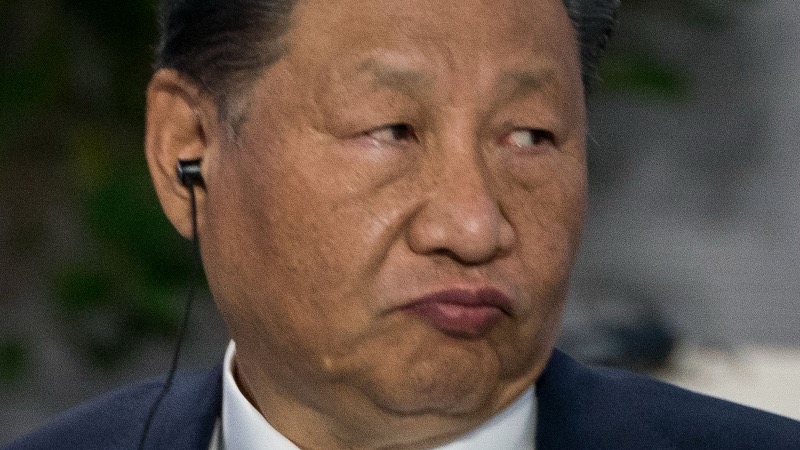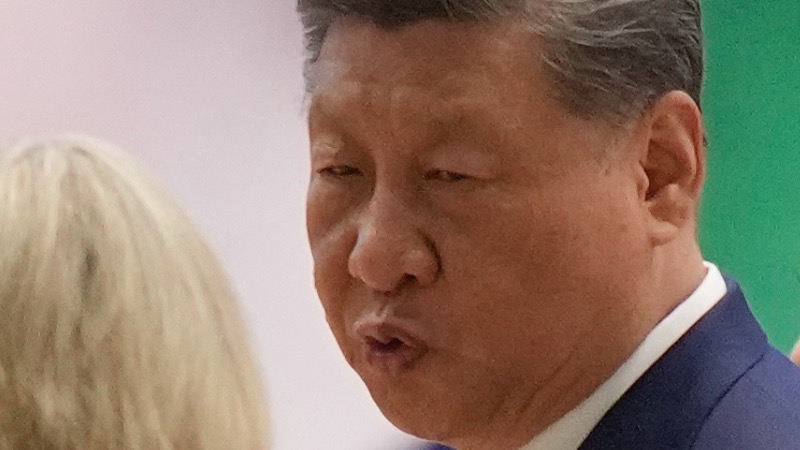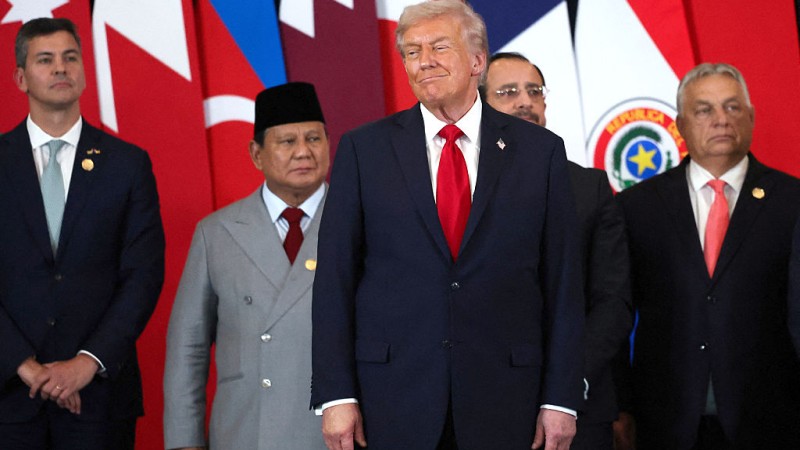 Image Credit: Kent Nishimura / Stringer / Getty
Image Credit: Kent Nishimura / Stringer / Getty On Monday Reuters reported that Chinese social media bot armies operating on Facebook were working to sway opinions in the Philippines away from Washington and toward Beijing. The Communist Chinese Party-associated information war comes as Beijing expands its domination over its South East Asian neighbors.
According to Reuters, a CCP-funded company has created bot armies which counter anti-Communist Chinese sentiment on Facebook, a U.S. social media platform:
The firm, InfinitUs Marketing Solutions, waged a cyber campaign paid for by China to weaken support for Philippine government policy and to sow discord over Manila’s security alliance with the United States, according to a review of the documents and the fake Facebook (META.O) accounts, as well as interviews with two former company employees and two Philippine officials.
The Chinese-owned company also used the fake profiles to amplify anti-American content created by Filipino writers, including some who had received money from Beijing, Reuters found.
For example, Reuters discussed one bot account, a “young man” named “Vince Dimaano.”
“His comments – like many responding to the Chinese embassy’s posts – weren’t genuine. They came from fake accounts paid for by the diplomatic mission, according to internal documents from a Manila-based marketing agency,” Reuters said.
Ironically, this CCP-connected firm even got its bot armies to attack the U.S. lethal Covid injections, not because Beijing is anti-vaccine or aligned with the MAHA agenda (as China had some of the most draconian Covid policies in the world, including forced vaccination with no opt-outs), but because attacking the lethal Western Covid injections was a point of contention it could grasp onto.
Just a reminder of what China’s anal swab test for COVID looks like.
— Dr. David Samadi (@drdavidsamadi) March 4, 2021
They have now made it mandatory for every foreign arrival into the country.
I can tell you one place I won’t be going soon. https://t.co/3HCo5yaImD
Notably however, the U.S. Department of War did this to China as well.
“Its work included disparaging the U.S.-Philippine alliance and Western-made COVID vaccines. The news agency also uncovered that InfinitUs had created Ni Hao Manila, a media outlet designed to look Filipino-run, according to the former employees,” Reuters said.
Human Rights Watch chronicled how China abducts Covid vaccine refusers, restrains them and force vaccinates them:
On Aug. 31, Hunan police went to Zhang Jianping’s home and questioned him about why he refused to get a COVID-19 vaccine. Both the Ministry of Education and the National Health Commission stipulated that vaccination should only be carried out with informed consent, Mr. Zhang says he told them. He stated explicitly that he was not informed, did not agree and did not want to be jabbed. Later, the police officers forced him into a car heading to a hospital. With several people holding down his legs and arms, Mr. Zhang was injected with a vaccine.
Mr. Zhang’s story is not an isolated account. A frenzy of forced vaccinations began in July after President Xi Jinping set a target of fully vaccinating 1.1 billion people, or 80 per cent of the population, by the end of October. The word qinling, or “zeroing,” was mentioned in many official documents issued by local governments. The Chinese Communist Party secretary in Huairen, Shanxi province, summed up its meaning in a meeting: “No family missed, no person left … achieve comprehensive zeroing for targeted population.”
It should also be noted that the Philippines also had one of the world’s strictest Covid vaccine mandates too:
Philippine President Rodrigo Duterte has threatened to order the arrest of Filipinos who refuse to receive COVID-19 vaccinations – in one of the most extreme vaccine mandate edicts to be made by any government worldwide.
“Because it is a national emergency, it is my position that we can restrain [unvaccinated people],” said Duterte in a televised Thursday address last week to the nation, in reference to a recent surge in infections.
“I’m now giving orders to barangay captains (village leaders) to look for those persons who are not vaccinated and request them to stay put [in their house].”
If these individuals refuse to vaccinate, or continue to leave their home, the barangay captain, being a person of authority, is empowered now to arrest the recalcitrant persons, he added.
The ChiCom bot armies operate on X (formerly Twitter) as well as Meta platforms. While vaccines were one topic the CCP bots used as a political football, their true agenda is purely geopolitical and not medical in nature. The pro-China influence operations even netted some real-life China shills award money too. Reuters reported:
InfinitUs employees used accounts masquerading as pro-Beijing Filipinos to attack the U.S. and abuse a prominent nationalist lawmaker, the profiles and company records show. The documents include an August 2023 contract tasking InfinitUs with “guiding public opinion” on Facebook and X, as well as work-progress reports created for the embassy.
Reuters identified at least ten Facebook accounts that were part of what InfinitUs called an “army” in the documents. The platform’s owner Meta did not comment on the influence campaign but confirmed the accounts violated policy and removed them after being alerted by the news agency.
The accounts also promoted pro-China content featuring Filipino media personalities. They include Rommel Banlaoi, a Chinese-educated counter-terrorism scholar whose 2022 nomination to be deputy national security advisor was successfully opposed by security officials.
Banlaoi was among dozens of prominent Filipinos who have received awards from the Association of Philippines-China Understanding (APCU) since 2021. The organization was re-established by ex-Philippine president Gloria Arroyo and a Chinese Communist Party (CCP) agency that the U.S. previously accused of “co-opting subnational governments.”
The embassy-funded awards came with thousands of dollars – multiples of the average Philippine monthly wage – APCU told Reuters.
“The end goal (of China) is to make the Philippines compliant,” Pilipino politician Francis Tolentino told Reuters.
Perhaps most notably are the Chinese bot armies agenda to sway elections. Reuters detailed how their investigation uncovered CCP bot accounts working to influencing foreign elections:
In fall 2020, InfinitUs brought online several Facebook accounts, which Reuters identified through an undated company report sent to the embassy. The document included records of comments the profiles had posted on the mission’s social pages.
The behavior of one of the profiles – “Vince” – was representative of the set.
“Vince” often praised China and defended its coast guard, while regularly sharing embassy content. The account lauded China’s Sinovac vaccine and circulated negative articles about Western-made shots.
“We should stop fighting China” on the maritime issue, “Vince” wrote.
InfinitUs did not appear to take great care in making the accounts seem authentic. The photo for one of the profiles was identical to an image for a “handsome Asian man” offered by visuals provider Dreamstime.
Dreamstime said it was aware its images were often misused by bot and troll networks and that it opposed such activity.
“Vince” also posted virtually identical reviews of businesses as two other accounts Reuters identified as controlled by InfinitUs, which Margot Hardy of online analysis firm Graphika said was a marker of inauthentic behavior.
InfinitUs was also behind profiles that attacked a prominent lawmaker, its embassy reports show.
The firm’s November 2024 report related how those accounts swarmed the profile of then-Congressman Robert Ace Barbers, a vocal proponent of legislation to bolster Filipino maritime claims.
The document described an “aggressive comment campaign” on Barbers’ Facebook posts that month to “protest his negative comments about China in relation to the new maritime protocols.”
It did not include examples. But days after the legislation passed, uncorroborated accusations of criminality began to multiply on Barbers’ previously published posts.
Barbers’ posts typically attracted several dozen comments each, but responses surged to the hundreds in late November.
“These trolls were programmed to influence the Filipinos to vote for someone,” said Barbers, referring to May’s midterm elections for which he was term-limited.
Chinese influence may not stop at the Philippines either, another Chinese-linked company is alleged to enable CCP bot armies in the U.S.
Texas AG Ken Paxton has launched an investigation into TP-Link Systems Inc., a major networking equipment manufacturer, for allegedly enabling the Chinese government to access and exploit American consumers’ data. Originally founded in Shenzhen, China, TP-Link is a leading supplier of office networking equipment in the U.S. The company recently created a spinoff with a new California headquarters, claiming full independence from Chinese affiliations. However, doubts persist about the validity of these claims, as well as TP-Link’s ownership, production methods, and potential ties to the Chinese government. Concerns include possible backdoors in TP-Link equipment that could allow the Chinese government to monitor network traffic and operate bot networks.
🚨CCP ALERT🚨
— Breanna Morello (@BreannaMorello) October 6, 2025
Texas AG Ken Paxton has launched an investigation into TP-Link Systems Inc., a major networking equipment manufacturer, for allegedly enabling the Chinese government to access and exploit American consumers’ data.
Originally founded in Shenzhen, China, TP-Link is…



